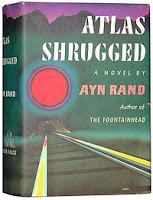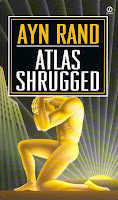 I am going to postpone the series on the fourth dimension for one more day because I would like to talk about the book I just finished, Atlas Shrugged. I mentioned this briefly when I talked about some of Ayn Rand’s philosophies; today I would like to review the book (don’t worry, I won’t give away any plot details).
I am going to postpone the series on the fourth dimension for one more day because I would like to talk about the book I just finished, Atlas Shrugged. I mentioned this briefly when I talked about some of Ayn Rand’s philosophies; today I would like to review the book (don’t worry, I won’t give away any plot details). The first thing people notice about Atlas Shrugged is that it is very, very long. And they’re right: the copy I read was 1,100+ pages, but the font was so small it probably comes out to about double that (I think my eyes are much worse after having read it). Unfortunately the length is complimented by the fact that there are huge sections that are almost unbearably boring, particularly in the first half of the novel. Atlas Shrugged is not light reading by any means, but that does not mean it is lacking in suspense—there are a multitude of scenes that are very captivating, it's just that most of them reside near the end of the novel, making the beginning boring.
Throughout the novel Rand lectures the reader, which some think detracts from the entertainment value of the book. To some extent this is true—her constant lecturing can be a bit annoying, but Rand’s ideas are the purpose of the novel in the first place, and I think the not-so-subliminal messages make it interesting. However, this message can get very repetitive, and the fact that the whole book is built around Rand’s philosophy does detract from both its entertainment value and its ability to be believed. At one point, just before the novel’s closing, one of characters launches into a 50-page lecture; this is the read “meat and potatoes” of the book, though it is incredibly boring as well. Almost all the characters are caricatures; they are either Rand’s heroes or her villains, either clearly “good” or clearly “evil.” As the novel progresses this becomes even more and more apparent; near the end of the novel the villains have become so pronounced that the plot just about lost whatever was left of its realism. Even in the names of Rand's villains is this obvious: the controller of the economy is Wesley Mouch, whose name is a clear reference to "mooch." Likewise, the President is Mr. Thompson, a reference to the machine gun commonly used by 1920's mobsters. Indeed, there are far too many characters, especially considering they can all be grouped into two factions. Also, the fact that some of the characters are introduced and then forgotten can become extremely annoying, as does the fact that the novel’s real main character is not introduced until the book is two-thirds over.

Of course, it is a must-read for anyone who fashions themselves an Objectivist or is interested in the works of Ayn Rand. The philosophy behind it is very interesting—even though I abhor Objectivism I found the concepts discussed very thought-provoking. Along with The Fountainhead and perhaps Anthem, Atlas Shrugged effectively describes the Objectivist philosophy and its applications. The Fountainhead uses Howard Roark to describe what Rand’s idea of a “prime mover” is; Atlas Shrugged shows how much the world needs Rand’s prime movers and what happens without them.
My final word is this: read it if you feel you are up to the challenge. Atlas Shrugged is the kind of book that keeps you from reading anything else at the same time, due to the multitude of characters and plot details to remember. Also, I strongly recommend that anyone who reads it keep an open mind while doing so. After about 500 pages or so, what Rand is preaching suddenly begins to make more and more sense, mostly likely because by that point you have heard it over and over and have been reading about a fictional world in which it does work (I suspect that this is why the book is so long in the first place). Always think about what Rand has to say, do not treat it as gospel.
I realize I never answer the question I asked in the title of today’s post, “Who is John Galt?” I’m not going to answer it entirely, as it would give away some plot details. I will simply say this: the phrase is an integral part of the novel, and each time you hear it it will mean something slightly different.

No comments:
Post a Comment